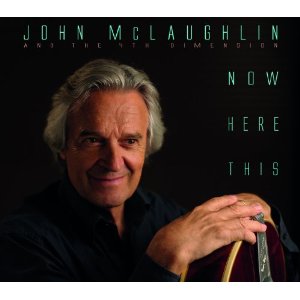
Abstract Logix
As much of John McLaughlin’s amazing guitar work as there is to be found on Now Here This – and there’s plenty of it – this album is a testament to the combined talents of the veteran fusioneer and his band The Fourth Dimension. With 70 years, a couple dozen albums, and a fair chunk of mind-blowing guitar history under his belt, McLaughlin proves himself to still be a six-stringed force to be reckoned with on Now Here This – but his bandmates are equally head-spinning on their respective weapons of choice.
Consider the album-opening “Trancefusion”: McLaughlin offers burst after burst of ideas, his guitar tone dense and muted; keyboardist Gary Husband works around, under, and between McLaughlin’s flurries with washes of sound that accent, chase, and challenge – eventually taking the lead himself for a bit. The interplay between the two makes for fascinating listening, but what really grabs ahold of you is the fierce rhythm dance between drummer Ranjit Barot and bassist Etienne M’Bappe. Barot actually lights the fuse on the piece with a quick roll; once he launches into it for real, he never looks back. A master of sounding like he’s hovering above the beat at times, Barot works the kit hard, applying amazing splashes of rhythm without ever sounding like he’s overplaying. M’Bappe in the meantime prowls the territory between the melodic lines and the percussion: at times he’s doing synchronized sonic somersaults with a wildly-rolling Barot; other times he’s punctuating one of McLaughlin’s thoughts or complementing a statement from Husband. And the process sounds effortless and natural in his talented hands.
Big talents with no egos to trouble the process: that’s the key to Now Here This.
Listen to “Call And Answer”, an amazing musical conversation that we’re privileged to be a party to. “Not Here Not There” offers a wistful melody on a soft bed of funk; “Guitar Love” is loaded with vintage McLaughlin fretboard acrobatics. “Echos From Then” starts off at an easy lope before things get bluesy. McLaughlin easily shapeshifts from cool hipster to feisty skypilot with Husband flying wingtip-to-wingtip alongside, soaring over the M’Bappe/Barot groove landscape below. “Wonderfall” is a showcase for Husband’s lovely keyboard work; “Riff Raff” features some of the album’s fiercest playing by all hands.
The album ends with the ultra-coolness of “Take It Or Leave It” with Husband’s keys providing the slopes for McLaughlin to glide upon. Barot works the groove hard without ever losing his hold; M’Bappe’s tone is hot, thick, liquid funkiness.
All in all, Now Here This is a milestone in John McLaughlin’s career for two reasons: first, as proof that he is still not only at the top of his personal game but a giant amongst guitarists past and present; secondly, as the debut of a band that one can only hope remains in McLaughlin’s orbit for years to come.



No Comments comments associated with this post